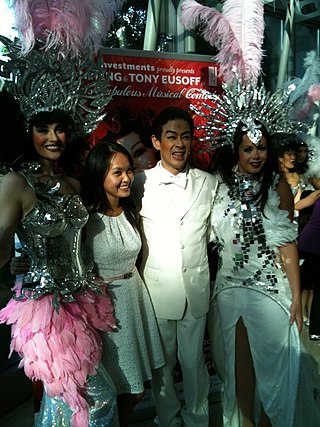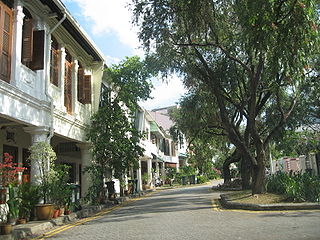Related Research Articles

The Peranakans are an ethnic group defined by their genealogical descent from the first waves of Southern Chinese settlers to maritime Southeast Asia, known as Nanyang, namely the British Colonial ruled ports in the Malay Peninsula and the Indonesian Archipelago, as well as Singapore. Peranakan culture, especially in the dominant Peranakan centres of Malacca, Singapore, Penang, Phuket and Tangerang, is characterized by its unique hybridization of ancient Chinese culture with the local cultures of the Nusantara region, the result of a centuries-long history of transculturation and interracial marriage.

Chinese Singaporeans are Singaporeans of Han Chinese descent. Chinese Singaporeans constitute 75.9% of the Singaporean citizen population according to the official census, making them the largest ethnic group in Singapore.

Ivan Heng is a Singaporean actor and theatre director of Peranakan descent. He is the founding artistic director of W!LD RICE, a theatre company in Singapore, and an outspoken advocate for respect for diversity and freedom of expression.

Singaporean cuisine is derived from several ethnic groups in Singapore and has developed through centuries of political, economic, and social changes in the cosmopolitan city-state.
The literature of Singapore comprises a collection of literary works by Singaporeans. It is written chiefly in the country's four official languages: English, Malay, Standard Mandarin and Tamil.
The following lists events that happened during 1963 in Singapore.

Wild Rice, founded in 2000 by Ivan Heng, is a professional theatre company in Singapore. In 2019, the company established a permanent performance venue at Funan Mall.
Beauty World is a Singaporean musical written by Michael Chiang and composed by Dick Lee. Drawing on the tradition of 1950s black-and-white Cantonese movies, it tells the story of a young Malaysian girl who comes from Batu Pahat to 1960s Singapore in search of her father and winds up in the eponymous sleazy night club. It premiered at the 1988 Singapore Arts Festival.

Alfian bin Sa'at, best known as Alfian Sa'at, is a prolific Singaporean playwright, poet, and writer. He is known for penning a body of plays, poems, and prose such as race, sexuality, and politics. Alfian has received a number of national literature awards, such as the 2001 Young Artist Award and three Life! Theatre Awards for Best Original Script. Alfian is the resident playwright of theatre group W!LD RICE.

The culture of Singapore has changed greatly over the millennia. Its contemporary modern culture consists of a combination of Asian and European cultures, mainly by Malay, South Asian, East Asian and Eurasian influences. Singapore has been dubbed as a country where "East meets West", "Gateway to Asia" and a "Garden city".

Kuo Pao Kun was a playwright, theatre director, and arts activist in Singapore who wrote and directed both Mandarin and English plays. He founded three arts and drama centres in Singapore, conducted and organised a number of drama seminars and workshops, and mentored Singaporean and foreign directors and artists.

Glen Goei is one of Singapore's leading film and theatre directors. His broad ranging body of work embraces the full gamut of the performing and visual arts and includes film, theatre, musicals, large scale shows, World Expos, dance, music, and architectural design.
Marc Goldberg is a French theatre director, playwright, actor, and translator.

Singaporeans are an ethnic group comprising citizens who identify themselves as a nation with the sovereign island city-state of Singapore. Singapore is a multi-racial, multi-cultural, multi-religious, and multi-lingual country. Singaporeans of Chinese, Malay, Indian and Eurasian descent have made up the vast majority of the population since the 19th century. The Singaporean diaspora is also far-reaching worldwide.
Desmond Sim Kim Jin is a Singaporean playwright, poet, short story writer, screenwriter and painter. His work, Places Where I've Been, won a Merit Prize in the 1993 Singapore Literature Prize for Poetry.

Peranakan Place, formerly known as Peranakan Corner, is a row of six two-storey shophouses facing Orchard Road, built around 1902 at the intersection of Emerald Hill Road and Orchard Road in the planning area of Newton in Singapore. It forms part of the Emerald Hill Conservation Area within the Orchard district in central Singapore.
Stella Kon is a Singaporean playwright. She is best known for her play, Emily of Emerald Hill, which has been staged internationally. She is a recipient of the S.E.A. Write Award.
Neo Swee Lin is a Singaporean actress who has appeared in several Asian media productions and theatrical works since the 1980s.

Ayam buah keluak is a traditional Peranakan dish consisting of chicken (ayam), tamarind gravy and buah keluak nuts. It is normally served with rice. It is also one of the favorite dishes of Singapore's founding Prime Minister, Lee Kuan Yew and his son, Lee Hsien Loong.
References
- 1 2 3 "Emily of Emerald Hill - Singaporean Identity on Stage". www.roots.gov.sg. Retrieved 10 July 2021.
- ↑ "About "Emily of Emerald Hill"". Centre 42. Retrieved 10 July 2021.
- ↑ Tan, Corrie (26 August 2014). "Classic Singapore plays #3 - Emily Of Emerald Hill". The Straits Times. Retrieved 10 July 2021.
- ↑ "Emily of Emerald Hill: A Reaffirmation of Peranakan Culture". Association for Asian Studies. Retrieved 10 July 2021.
- ↑ Auto, Hermes (7 September 2019). "Theatre review: Ivan Heng impresses with subtle actorly touches in Emily of Emerald Hill | The Straits Times". www.straitstimes.com. Retrieved 27 December 2022.
- ↑ "Emily of Emerald Hill: A Reaffirmation of Peranakan Culture". Association for Asian Studies. Retrieved 27 December 2022.